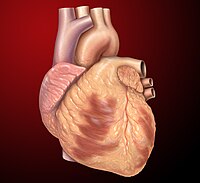
Photo from wikipedia
none Many studies demonstrated that cardiac involvement predicts poor prognosis in patients with systemic light-chain amyloidosis (AL). There is no data about the effect of the arrest of progression of… Click to show full abstract
none Many studies demonstrated that cardiac involvement predicts poor prognosis in patients with systemic light-chain amyloidosis (AL). There is no data about the effect of the arrest of progression of cardiac amyloidosis on prognosis after chemotherapy. Arrest of progression of cardiac amyloidosis is associated with favorable outcome in patients with light-chain amyloidosis. Among 126 consecutive patients with AL, we prospectively examined 94 patients serially after optimal therapy. The mean follow-up period was 1405 ± 1510 days (median value 734 days, inter quartile range 176-2343 days). Wall thickness was measured from left ventricular (LV) m-mode trace. We defined the cardiac involvement as mean LV wall thickness >12mm, and the regression or progression of cardiac amyloidosis as change in LV mean wall thickness >1mm. Among 94 patients with AL, 28 patients (30%) showed regression by definition above, 35 patients (37%) showed no interval change and 31 patients (33%) showed progression of cardiac amyloidosis. Survival analysis of 3 groups demonstrated that the regression and arrest of progression groups showed better outcome compared with the progression group (Log-rank test P < 0.0001). The arrest of progression of cardiac amyloidosis predicts favorable outcome in patients with AL amyloidosis. Abstract P29 Figure. Kaplan-Meier Curve of 3 groups
Journal Title: European Heart Journal
Year Published: 2020
Link to full text (if available)
Share on Social Media: Sign Up to like & get
recommendations!